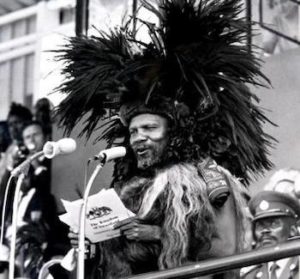
*On this date in 1968, Swaziland gained its independence from Britain.
This was another step for African countries' self-rule after the white European invasion resulting from the Berlin Conference of 1884. Following the 1967 elections, Swaziland was a protected state until independence was regained the following year. Following the elections of 1973, the constitution of Swaziland was suspended by King Sobhuza II, who ruled the country by decree until he died in 1982. At this point, Sobhuza II had ruled Swaziland for almost 83 years, making him the longest-reigning monarch in history.
A regency followed his death, with Queen Regent Dzeliwe Shongwe as head of state until 1984, when she was removed by the Liqoqo and replaced by Queen Mother Ntfombi Tfwala. Mswati III, the son of Ntfombi, was crowned king on April 25, 1986, as King and Ingwenyama. The 1990s saw a rise in student and labor protests pressuring the king to introduce reforms. Thus, progress toward constitutional reforms began, culminating with the introduction of the current Swazi constitution in 2005. This happened despite objections by political activists. The current constitution does not deal with the status of political parties. The first election under the new constitution took place in 2008. Members of parliament were elected from 55 constituencies. These MPs served five-year terms, which ended in 2013.
In 2011, Swaziland suffered an economic crisis due to reduced SACU receipts. This caused the government to request a loan from neighboring South Africa. However, they did not agree with the conditions of the loan, which included political reforms. During this period, there was increased pressure on the Swazi government to carry out more reforms. Public protests by civic organizations and trade unions became more common. Starting in 2012, improvements in SACU receipts have eased the fiscal pressure on the Swazi government. A new parliament, the second since the promulgation of the constitution, was elected on 20 September 2013. The king reappointed Sibusiso Dlamini as prime minister for the third time.
On April 19, 2018, King Mswati III announced that the Kingdom of Swaziland had renamed itself the Kingdom of Eswatini, reflecting the extant Swazi name for the state eSwatini, to mark the 50th anniversary of Swazi independence. The new name, Eswatini, means "land of the Swazis" in the Swazi language and was partially intended to prevent confusion with the similarly named Switzerland. Eswatini workers began anti-government protests with low salaries on 19 September 2018. They went on a three-day strike organized by the Trade Union Congress of Eswatini (TUCOSWA), resulting in widespread disruption.
In late June 2021, pro-democracy protests broke out nationwide, sparking riots, looting, and street skirmishes with police and soldiers. This civil unrest began because of years of anger towards the lack of meaningful reforms that would nudge Eswatini in the direction of democracy, as well as the government's reported banning of the submission of petitions—the New York Times called the turmoil in the landlocked nation, "the most explosive civil unrest in its 53 years of independence".
State security forces killed at least 20 people, and dozens were injured and detained. The government also shut down the internet (with the compliance of mobile providers MTN and Eswatini Mobile), making it difficult to access reliable news from the country during this time. The King is also said to have fled the country, though government officials have disputed these claims, calling for an end to the protests.